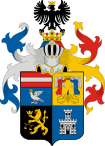Tokaj
Tokaj | |
|---|---|
 | |
| Coordinates: 48°07′17″N 21°24′45″E / 48.121443°N 21.412468°E | |
| Country | |
| County | Borsod-Abaúj-Zemplén |
| District | Tokaj |
| Area | |
| • Total | 28.2 km2 (10.9 sq mi) |
| Population (2017) | |
| • Total | 4,155[1] |
| Demonym | tokaji |
| Population by ethnicity | |
| • Hungarians | 85.3% |
| • Gypsies | 1.3% |
| • Germans | 0.6% |
| • Slovaks | 0.2% |
| • Ruthenians | 0.1% |
| • Ukrainians | 0.1% |
| • Others | 0.8% |
| Population by religion | |
| • Roman Catholic | 29.0% |
| • Greek Catholic | 10.1% |
| • Calvinists | 20.0% |
| • Lutherans | 0.6% |
| • Other | 0.7% |
| • Non-religious | 8.6% |
| • Unknown | 31.0% |
| Time zone | UTC+1 (CET) |
| • Summer (DST) | UTC+2 (CEST) |
| Postal code | 3910 |
| Area code | (+36) 47 |
| Website | www |
Tokaj , is a historical town in Borsod-Abaúj-Zemplén county, Northern Hungary, 54 kilometers from county capital Miskolc. It is the centre of the Tokaj-Hegyalja wine district where Tokaji wine is produced.
History

The wine-growing area was first mentioned by the name Tokaj in 1067. The town itself was first mentioned in documents in 1353. Its first castle was a motte, which was destroyed during the Mongol invasion of Hungary. By the 14th century the town already had a stone castle, belonging to the Diósgyőr estate.
After 1450 Tokaj was the property of the Hunyadi family, so after Matthias Hunyadi became king, the town became a royal estate. In 1705 Francis II Rákóczi ordered the castle to be destroyed.
After the Austro-Hungarian Compromise of 1867 the town prospered, but when the world wars came, it suffered a lot, lost its importance and its town status. Even its role in wine trade was taken over by Sátoraljaújhely.
Tokaj was granted town status again in 1986 and it started to prosper again. Now the town is a popular tourist attraction.
Tokaj wine region

Tokaj wine region is a historical wine region located in northeastern Hungary and southeastern Slovakia. It is one of the seven larger wine regions of Hungary (Hungarian: Tokaji borrégió). Hegyalja means "foothills" in Hungarian, and this was the original name of the region.
The region consists of 28 named villages and 11,149 hectares of classified vineyards, of which an estimated 5,500 are currently planted. Tokaj has been declared a World Heritage Site in 2002 under the name Tokaj Wine Region Historic Cultural Landscape. However, its fame long predated this distinction because it is the origin of Tokaji aszú wine, the world's oldest botrytized wine.
International relations
Twin towns — Sister cities
Tokaj is twinned with:
 Binyamina-Giv'at Ada, Israel
Binyamina-Giv'at Ada, Israel Cormons, Italy
Cormons, Italy Dej, Romania
Dej, Romania Oestrich-Winkel, Germany
Oestrich-Winkel, Germany Rust, Austria
Rust, Austria  Supetar, Croatia, since 2016
Supetar, Croatia, since 2016
Main sights
- Main square with City hall; the Bacchus fountain; the Catholic Church; and other monuments
- Roman Catholic Church
- Tokaj Gallery (former Orthodox church—government has announced intentions to restore[4])
- Tokaj Museum (Karácsony house)
- Wine cellars
- Rákóczi-Dessewffy castle
- Tisza bridge
- Synagogue
- Tokaj open stage (″Fesztivalkatlan″)
-
City center
-
Bacchus fountain
-
Interior of Roman Catholic Church
-
Jewish cemetery
-
River Tisza in winter with Tokaj bridge
External links
![]() Tokaj travel guide from Wikivoyage
Tokaj travel guide from Wikivoyage
- Official website in Hungarian
- Tokaj and the Historic Wine Region - tourism information
- Gallery
- Aerial photographs
- Tokaj at funiq.hu










